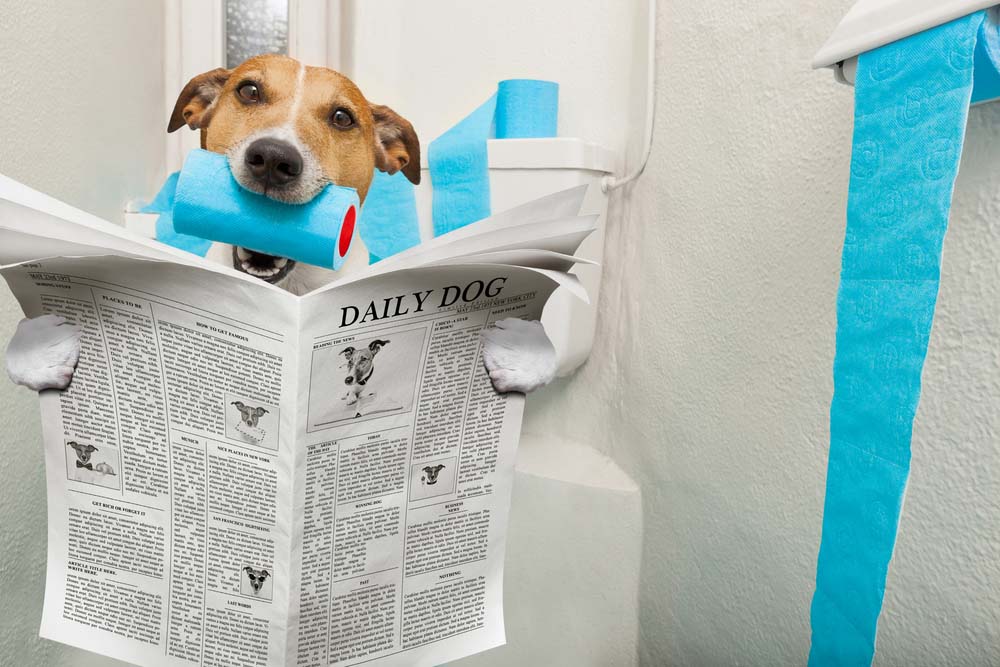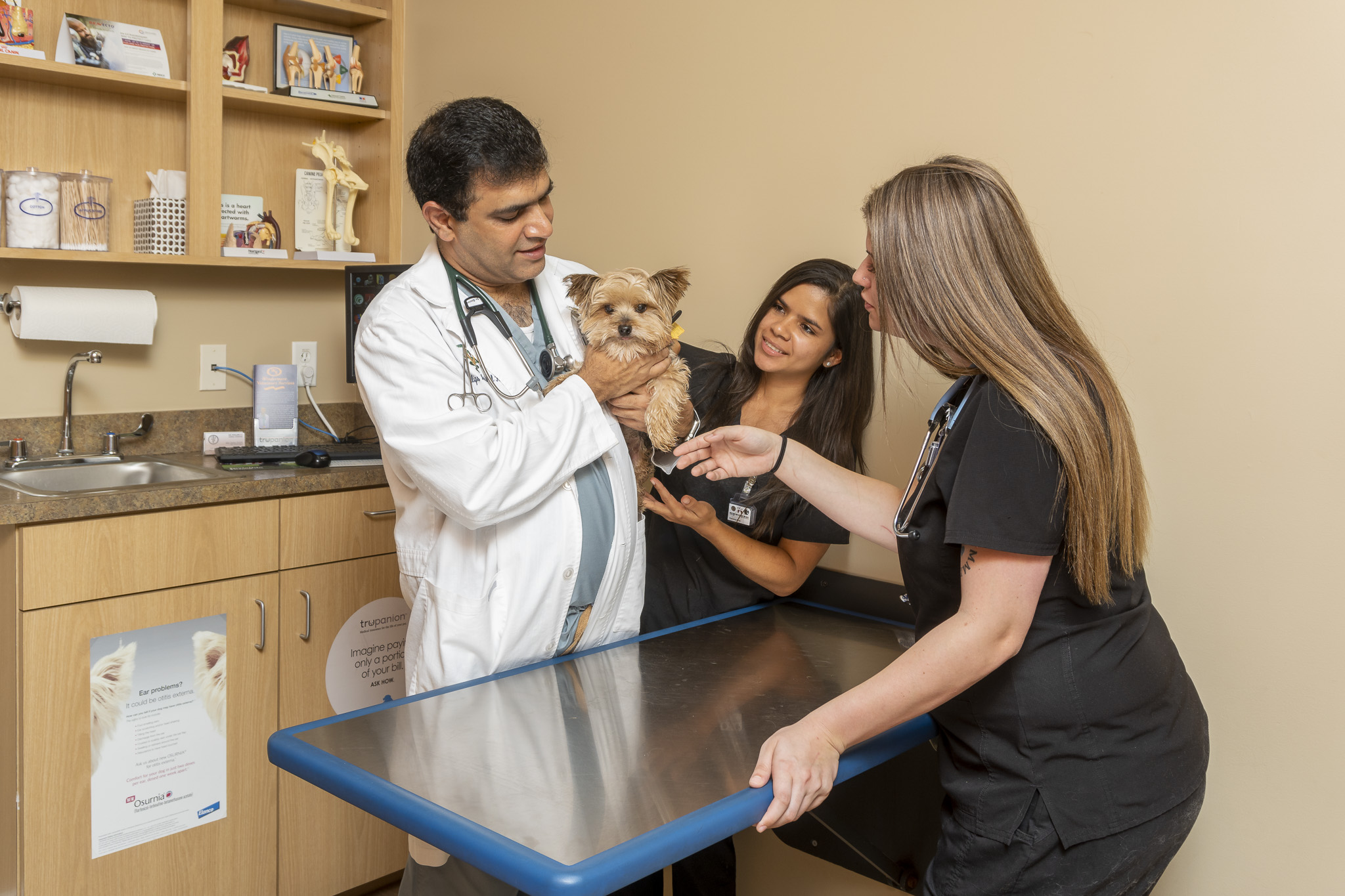
We're here for you
Emergency?
If your pet is exhibiting concerning symptoms or experiencing a medical emergency, please call our clinic at (407) 352-2579. We’ll help you through it.

While an upset stomach can happen to any pet occasionally, chronic or severe diarrhea should never be overlooked. Diarrhea is a common symptom of some gastrointestinal disorders or parasitic infections, so the symptom should never be ignored.
If you are unable to pinpoint one of the less severe, more typical reasons your pet may have diarrhea, it may be time for a vet consultation. A vet can provide diagnostic testing to help determine if there is a serious underlying medical condition causing the gastrointestinal upset.
Common Reasons Your Pet May Have Diarrhea
Pets may have diarrhea for a variety of reasons. It could be as simple as behavioral stress, or it could be indicative of a parasitic infection. To understand the exact cause you’ll need to evaluate the different possible reasons for the stomach problems and consult with your local veterinarian.
Stress
The brain and microbiome are intrinsically connected. When animals feel stressed, their digestion may in turn slow down during that sensation of “fight or flight” mode. When their digestion isn’t functioning properly, their stool won’t come out how it should.
Intestinal Parasite
Parasites such as hookworm or giardia can cause diarrhea in pets. Parasites can infect the walls of the intestine and cause uncomfortable pain in the abdomen and an inability to process food. Pets can get an intestinal parasite from eating undercooked meat or eating something such as another animal’s feces. Intestinal parasites typically require medical intervention, so it’s important not to let a possible parasite present in your pet go untreated.
Irritable Bowel Disease (IBD)
Just like humans can get irritable bowel disease, so can our pets. IBD is characterized by chronic inflammation of the gut lining with frequent symptoms of stomach pain, nausea, or diarrhea. The longer the tissues of the intestines are inflamed, the less nutrients pets can absorb from their diet. Without treatment, IBD can eventually lead to other ongoing health conditions.
Medication Side-Effects
Some pet medications prescribed by a vet can have uncomfortable side effects for your pet. If your pet starts having frequent diarrhea after starting treatment, talk to your vet about different treatment options to lessen the severity of side effects and get your pet feeling healthy again.
Gastroenteritis
If a parasitic infection isn’t the root cause, it may be a viral or bacterial infection such as gastroenteritis. Gastroenteritis is a short-term digestive illness that causes abdominal cramping, vomiting, and diarrhea. The infection is often caused by foreign bodies like a virus overtaking the healthy gut flora, or exposure to spoiled food.
Allergic Reaction
While we often think of an allergic reaction being signs of hives of itching, diarrhea could also be a symptom of an allergic reaction. If your pet eats something that they are allergic to, their immune system will respond negatively by not properly digesting it. This indigestion leads to diarrhea, blood in the stool, or runny stool.
How Can I Stop My Pet From Having Diarrhea?
If you notice your pet having diarrhea, it can be an unpleasant experience. A good first step is at-home care and lifestyle changes for your pet. From there, if dietary or other changes are not easing symptoms, reach out to a vet near you for help.
Assess Your Pet’s Diet
If the food you’re feeding your pet is triggering uncomfortable symptoms like diarrhea, it may be time to try a new brand of pet food, or even try giving them pet-safe foods like pumpkin to ease digestion. Always consider whether your pet ate any food that may be harmful to them.
Reduce Environmental Contaminents
Make sure that your pet’s surroundings are clean and sanitary. If you leave old food lingering out for mold and bacteria to come around, this is something you would want to remove from a pet’s environment to avoid accidental contamination.
Consult With a Vet
If nothing seems to help clear away diarrhea after testing out at-home care, you’ll need to take your pet to a medical professional. A veterinarian can take a look at the coinciding symptoms and test for a possible parasite or infection of the intestines. From there, a vet will provide a personalized treatment plan to get your pet’s digestion back on track in no time.

Step One:
Call us to book your pet’s appointment.

Step Two:
Our expert vet will take care of all of your pet’s needs.

Step Three:
Get back to enjoying your happy and healthy life with your furry best friend.

Get the Best Care for Your Pet
Come Visit Dr. Qasim
Book your pet’s appointment with Dr. Qasim to ensure a long, happy life together.

We love and care for each patient as if they were our own pet.
Meet Our Team of Animal Lovers
Dr. Bilal Qasim, DVM, established Dr. Phillips Animal Hospital in 2011 after practicing veterinary medicine for over 17 years with the help of talented and caring veterinary technicians.


